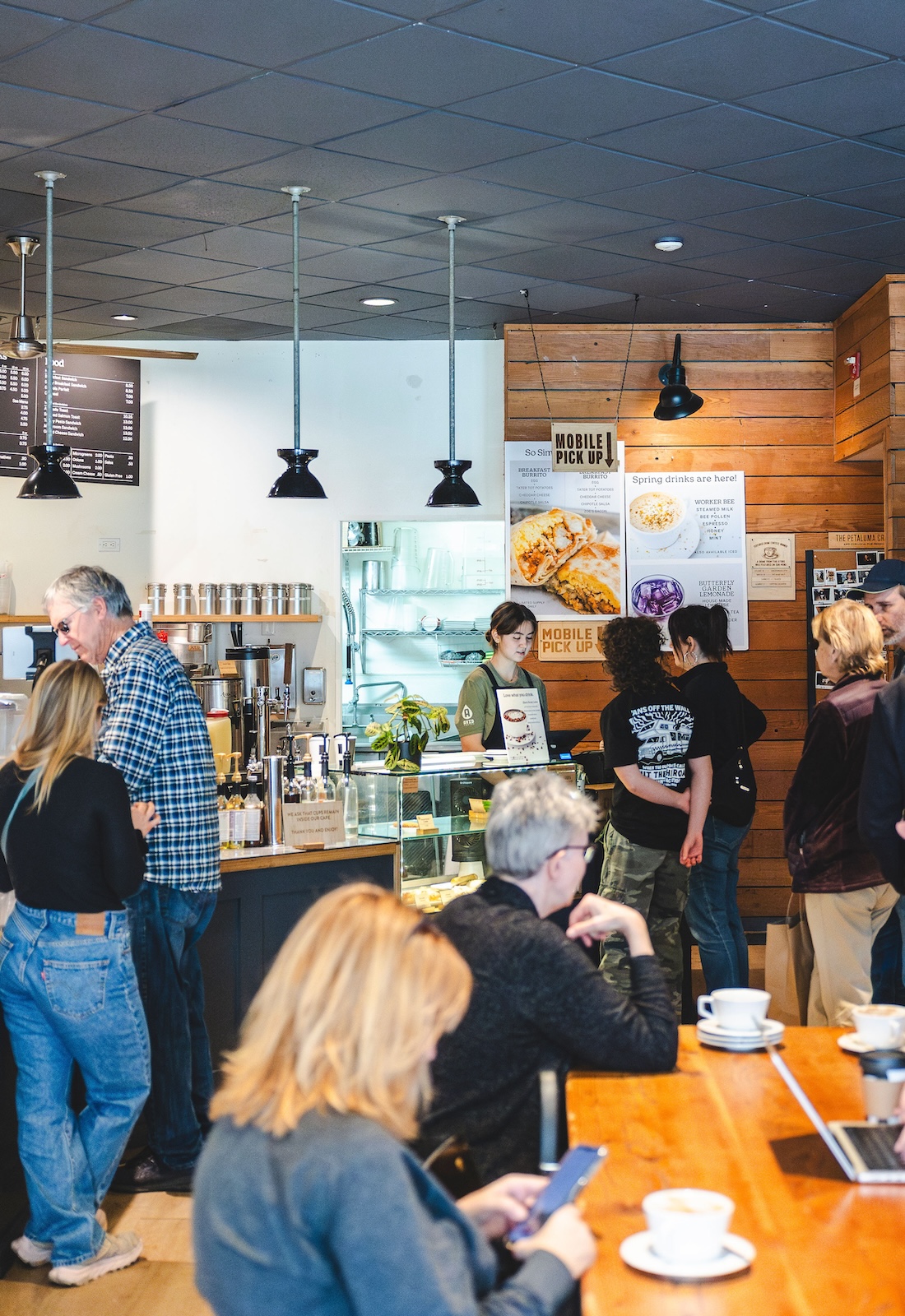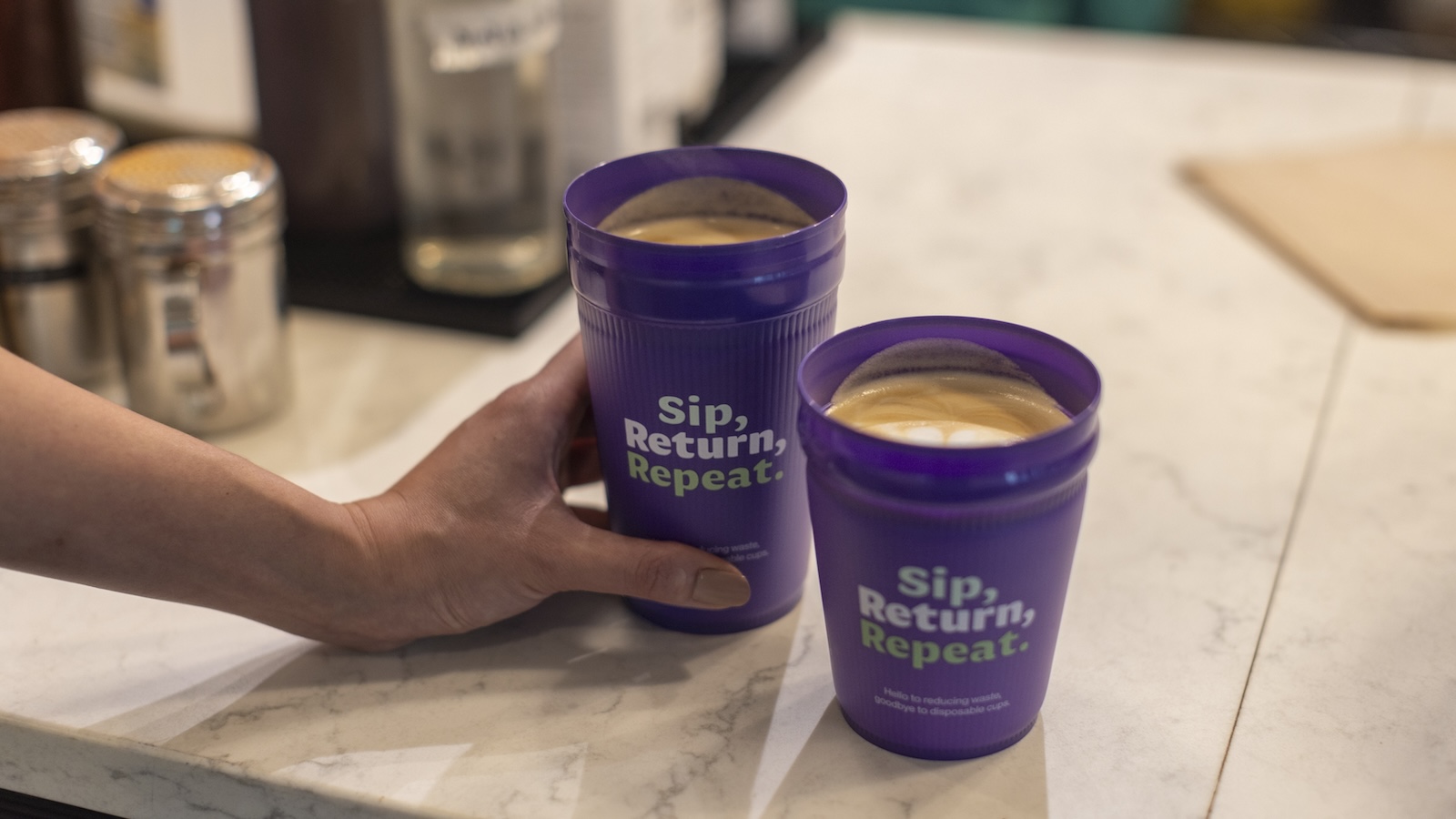Next month, more than 30 chain restaurants and locally owned coffee shops and eateries in Petaluma, California, will begin providing beverages in reusable cups by default as part of a first-of-its-kind pilot program meant to reduce pollution from single-use plastic.
Through the Petaluma Reusable Cup Project — a three-month pilot program sponsored by a food and beverage industry group called the NextGen Consortium — customers will be served hot and cold beverages in bright purple reusable plastic cups, unless they ask for disposables or bring their own mugs. After drinking their coffees, teas, or sodas, they’ll be able to return the cups at any of the participating establishments, or at one of 60 return receptacles placed strategically throughout the city.
A reuse logistics provider, Muuse, will be in charge of collecting, washing, and redistributing the clean cups back to the coffee shops and restaurants.
Kate Daly, managing director of the impact investment firm Closed Loop Partners — which oversees the NextGen Consortium — said the program will be a major milestone. Existing reusable cup programs tend to operate in sports stadiums, concert halls, and other confined spaces where it’s easier to keep track of inventory. No other citywide program in the U.S. has made reusable cups the default option across so many different foodservice brands.
The project aims to achieve an “unprecedented saturation of reusable packaging” within Petaluma, Daly told Grist. Thanks to funding from the NextGen Consortium — founded by Starbucks and McDonald’s and supported by companies including PepsiCo and Coca-Cola — she said hundreds of thousands of reusable cups will be deployed throughout the city in preparation for the program’s August 5 start date.
Participating locations will include Starbucks, Peet’s Coffee, Dunkin’, KFC, and The Habit Burger Grill, as well as local cafes and restaurants like the Petaluma Pie Company and Tea Room Cafe. Closed Loop Partners said they selected Petaluma — a city of about 60,000 people just north of San Francisco — because of its dense, walkable downtown, and because of residents’ receptivity to reuse programs. Many people may have grown familiar with reuse last year, when Starbucks tested a smaller-scale reusable cup program at 12 locations between Petaluma and another city nearby.
Although the new program is confined to Petaluma and will only last three months, it could help inform initiatives in other cities that are seeking to do away with single-use plastic packaging, the overwhelming majority of which is made from fossil fuels. The U.S. produces close to 40 million metric tons of plastic waste every year and recycles only 5 percent of it; the rest gets sent to landfills or incinerators, or ends up as litter.
Some types of plastic, including disposable cups, are even more unlikely to be recycled. According to the most recent data from the Environmental Protection Agency, from 2018, the U.S. produces more than 1 million tons of plastic plates and cups annually and recycles virtually none of it.
Reuse programs are supposed to help by driving down demand for new plastic packaging. Some initiatives allow customers to bring their own containers to grocery stores and restaurants; others involve store-owned containers that customers borrow and then return. According to the Ellen MacArthur Foundation, the most effective returnable container programs could reduce materials use by up to 75 percent and greenhouse gas emissions by up to 70 percent, compared to the status quo. The nonprofit also estimates that U.S. businesses could save some $10 billion in material costs if they replace just 20 percent of their single-use plastic packaging with reusable alternatives.
In designing the Petaluma Reusable Cup Project, Daly and her colleagues sought to ensure a smoother experience than what has been offered in previous trials, including some in the San Francisco Bay Area that were launched by the NextGen Consortium. One key focus was on what she called “precompetitive collaboration,” or getting businesses to buy into a common reuse system in which all of the elements — cups, logistics, messaging — are shared. This might go against companies’ competitive instincts, but it reduces costs so that businesses can participate in a larger reuse system instead of managing one on their own.
To make the program easy to participate in, the Petaluma Reusable Cup Project will be free and won’t involve any customer tracking. Most other reusable cup programs rely on financial motivations to make sure inventory doesn’t get lost — either they charge customers a small, returnable deposit when they borrow a reusable container, or they take down the customer’s credit card information so they can be charged if they fail to return the container after a set amount of time. These options often require downloading a program-specific app.
In Petaluma, however, customers won’t have to do anything to participate — they’ll just order their drinks as normal, with no additional payment or exchange of personal information. A QR code on each cup will direct customers to a website with instructions on how and where to return them — at one of the participating eateries, in return receptacles on city streets or in convenience stores and supermarkets, or by scheduling a home pickup by Muuse.

Rob Daly (no relation to Kate) is owner and president of Avid Coffee, an independent coffee shop with a location in downtown Petaluma. He said the extensive network of return locations made it a “no-brainer” to participate in the Petaluma Reusable Cup Project. Having reliable access to a return point “takes the guesswork out of the consumer’s hands and makes it easier on them,” he told Grist. “When they walk out of my store and they see a drop point, whether it’s my drop point or at multiple locations that are around me or around town — that solves everything.”
Not charging for cups or tracking customers may encourage more people to participate, but it’s also something of a gamble. If lots of customers decided to keep or forgot to return their containers, the Petaluma Reusable Cup Project Project would have no way to hold anyone accountable — it would have to eat the cost of replacing those cups. But Kate Daly said her team has taken some steps to mitigate this problem, like labeling the cups with the message “sip, return, repeat” to remind customers not to throw them away. The cups’ bright purple color is meant to make them “the right kind of ugly,” as Kate Daly put it, to discourage people from keeping them at home.
More importantly, the cups are not individually very valuable — they’re made of an inexpensive rigid plastic called polypropylene — so it won’t represent a huge loss when some inevitably go missing.
Many other reuse programs have opted for polypropylene containers too, despite concerns that they can still leach toxic chemicals and the inherent challenges with recycling them. Some environmental groups argue that single-use plastics should be replaced with reusable containers made of metal and glass, which are more inert and easier to recycle. Most plastic can only be recycled once or twice before it has to be “downcycled” into lower-quality products like carpeting.
Kate Daly said the Petaluma project chose polypropylene because it weighs less than alternative materials and thus causes fewer greenhouse gas emissions during transport. She also said stainless steel cups sometimes get watermarks on them after many washing cycles, causing customers to think they’re unclean.
NextGen’s funding for the Petaluma Reusable Cup Project will last until the end of October. After that, it will be up to city officials to decide whether they want to continue — and find a way to pay for — the program, with or without any structural changes.
Georgia Sherwin, Closed Loop Partners’ senior director of strategy and partnerships, told Grist that some return bins will stay up after the program’s end date so customers can continue bringing their cups back. “The results from the first three months of the initiative will ultimately inform the next rounds of iteration and what a continuation or future reuse program like this would look like in Petaluma and beyond,” she wrote in an email.
Once the cups are collected, Sherwin said her organization aims to “maximize their uses before being recycled,” potentially by donating them to local schools, cafeterias, and businesses.





